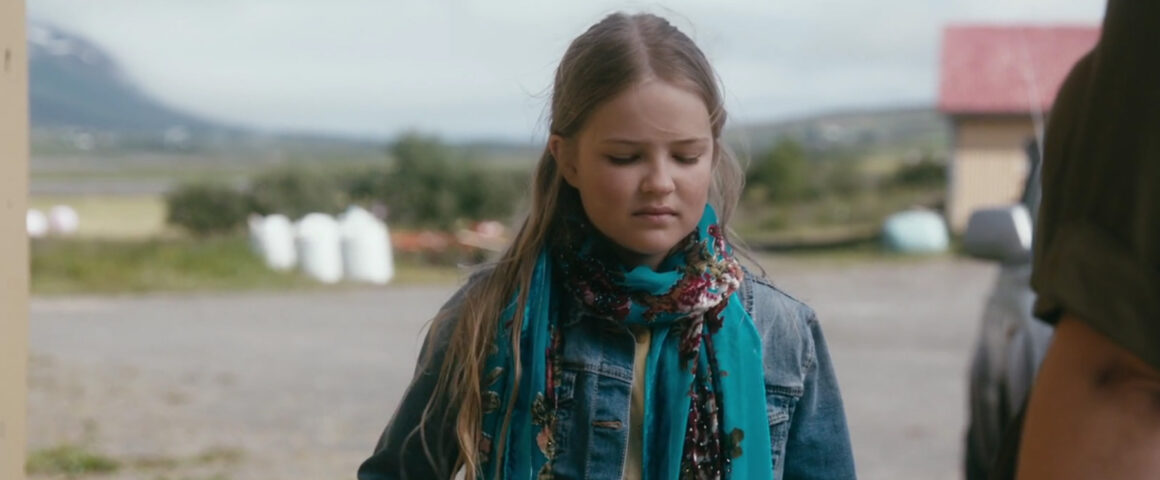Ása Helga Hjörleifsdóttir, director and screenwriter of The Swan (“Svanurinn”), a low-key Icelandic film (adapted from the 1992 novel by Guðbergur Bergsson) was asked in an interview how she tackled the job of transforming a novel written with a preponderance of interiority into a movie. The question can be answered by examining its cinematography, which provides a POV perspective from the perception of Sól (Gríma Valsdóttir), the film’s nine-year-old protagonist. Much of the film’s conflict revolves around Sól’s dissatisfaction during a summer she spends at the farm of her pragmatic aunt (Katla M. Þorgeirsdóttir, “Jitters”) and hard-working uncle (Ingvar Eggert Sigurðsson, “Everest”). The experience is designed to teach her about the value of work, a purported cure for being guilty of the travesty of shoplifting. However, no one considers that her “crime” may be a means to express the fact that she is symbolically seeking love and nurturing.
Sól’s inner thoughts are expressed through lengthy shots of an unforgiving shoreline and a barren landscape. These are complemented through voiceovers that serve as externalizations of Sól’s consciousness and conscience. Her ruminations are so passionate, at times, that they are like etched runes attempting to unlock the purpose of her life. Yet what makes the film successful is Gríma Valsdóttir’s wonderful acting. Ms. Valsdóttir can communicate Sól’s troubled inner life in a glance, and can present glimpses of her soul as she reacts to the world of the farm. This isn’t to suggest that Valsdóttir’s acting stands apart from the other fine portrayals. However, as she is the focus of the story, her presence takes center stage. She is the major key in the conflict, but her dissatisfactions are soon added to by the introduction of Jón (Thor Kristjansson, “Dracula Untold”), the seasonal farmhand with a melancholy demeanor. His isolation and dissatisfaction is similar to that of Sól. It’s just that he has had more experience.
Jón’s unhappiness is revealed through his journal writing and later, through conversations with the young girl as they share their perceptions of dislocation and loss. Their discussions center on a disdain for the tedium of farm life, and more generally, on the seeming impossibility to live a life that fulfills longing and clears up emotional confusion. Initially, Jón explains that he is “on an exploration.” In his journal, though, he writes, “my life has been a series of mistakes.” He tells Sól that with adulthood comes misery. This admission seems to predict that his exploration will not broaden his life, but will simply add to it. His writing articulates a view of the host family’s lifestyle that Sól cannot yet put into words: “All you think of is usefulness. Something complex makes you unable to cope.”
Next to arrive at the homestead is the family’s daughter, Ásta (Þuríður Blær Jóhannsdóttir, “A Reykjavík Porno”), on vacation from university in Germany. She is the insider as outsider, no longer content (if she ever was) with such a “predictable” family. Ásta is reminiscent of a Chekhovian character, the one in each of the Russian dramatist’s plays that fantasizes about escaping a provincial society in order to achieve personal liberation, only to realize change comes from within. Ásta expresses her frustration by mocking her family’s dull traditions and by demeaning Jón’s writing, joking that she looks forward to seeing it become a best seller.
Halfway through the film, a member of the isolated farming community sums up the dissatisfactions of the trio. During a local festival, the woman looks at a bleak, barren, mountain and, referring to a local myth, states, “A monster lives in the mountain who turns into a swan. It tells you who you really are — so you will drown.” The monster is everyday life, which slowly grinds down lofty dreams of the future. Thus, The Swan raises the question of whether stoicism is the best way to avoid unnecessary suffering that is in store for anyone that anticipates an abstract fulfillment that never arrives. It suggests that the alternative is preferable: that sheer fortitude is the easy way out—a means to accept the fact that life is not meant to cater to one’s dreams and ambitions. To think so is to face ultimate disappointment.
The Swan is a quiet film images that suggest myth, and as such, has the tenor of a parable. The pace is slow, but thanks to the director’s ability to integrate depictions of a symbolically desolate setting, voiceovers that reveal the inner ruminations of its characters, and domestic confrontations that hint of incipient flare-ups, the film is never boring. The action does not evolve into a dramatic build-up that culminates in a crisis and resolution. Rather it presents a series of actions that suggests that things may not magically change, but by accepting the experience of life, existence may be tolerable.



